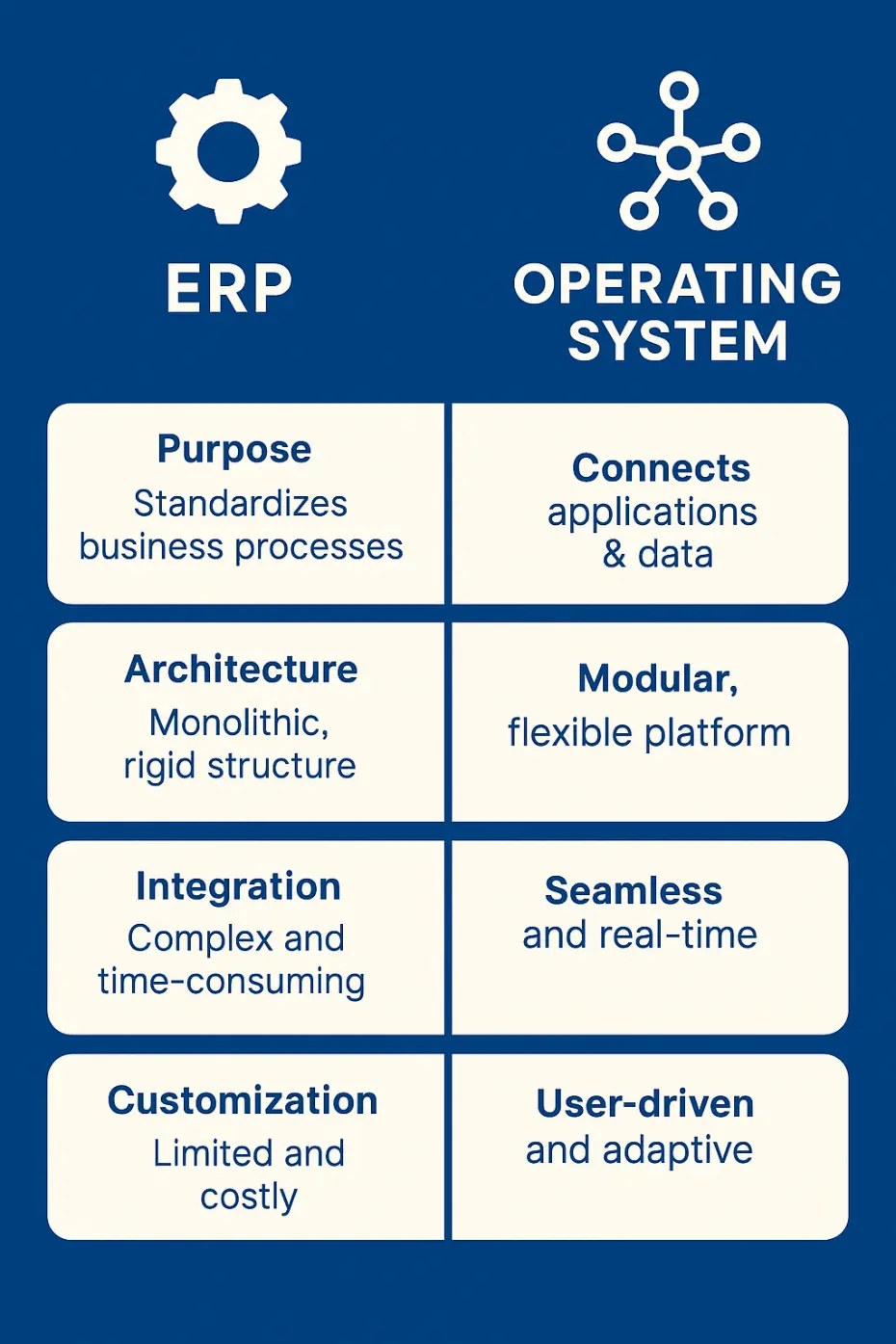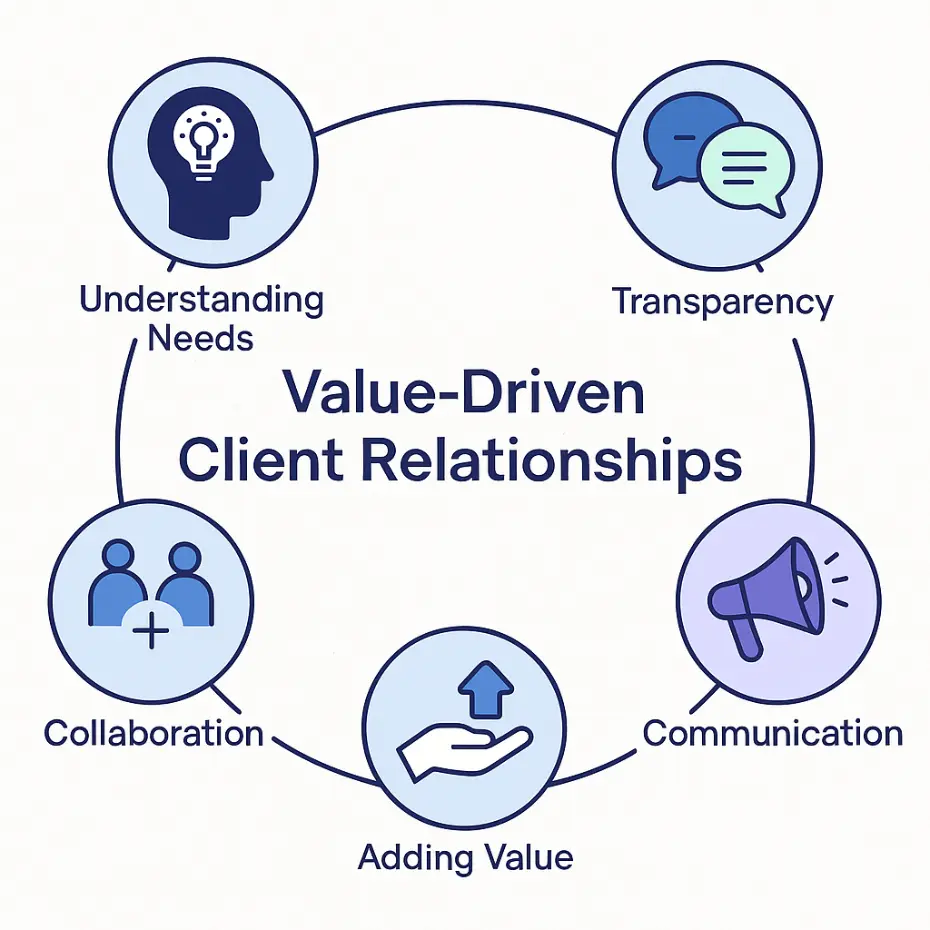For decades, ERP systems were hailed as the central nervous system of the enterprise. They promised to connect business functions, automate workflows, and provide one version of the truth.
But in 2025, business no longer happens in fixed offices, fixed workflows, or fixed software. It happens across locations, devices, and systems - fast, fluid, and increasingly personalized.
And so, a shift is happening:
We’re moving from ERP systems to business operating systems. And one platform - Odoo is quietly leading that evolution.
From Software Stack to Operating Layer
Think of your business as a living, learning system. Your sales team feeds your production team. Your HR team shapes your project capacity. Your procurement cycle impacts your cash flow.
What connects all these moving parts?
In the past, it was spreadsheets. Then came ERP systems. But those too often created new problems: rigid modules, siloed data and change cycles measured in quarters.
Today’s leading companies are choosing platforms that behave more like operating systems:
- Modular
- Real-time
- Agile
- And extensible without massive IT overhead
Why Odoo Is More Than Just an ERP
At first glance, Odoo might look like “just another ERP.” But in practice, it behaves much more like a business OS.
Let’s break it down:
1. Modular by Design
You don’t need to adopt everything at once. Start with CRM + Sales. Add Inventory and Accounting later.
Need HR, Projects or Helpdesk? Plug them in when you're ready.
This lets Odoo scale with your business, not the other way around.
2. Open and Extensible
With its open-source core and thousands of community modules, Odoo becomes what you need it to be - fast.
You’re not stuck waiting on vendors for basic improvements. You can build on top, without breaking what's already working.
3. Unified Data Layer
Every module talks to every other module.
When a sales order is confirmed, inventory is reserved, project timelines are updated and invoicing is triggered automatically.
No integrations. No double-entry. No miscommunication.
4. Low Total Cost of Ownership
Unlike legacy ERPs, Odoo doesn’t punish you for growing.
You don’t pay per module, per API call, or per server. You get a platform — and you decide how far to take it.
ERP vs Operating System — A Quick Comparison

ERP systems were traditionally built around static, predefined workflows. They were designed for stability, not agility. But the modern business world doesn’t operate in that static environment anymore.
An operating system approach like what Odoo enables - lets businesses evolve how they operate without changing platforms.
Real Impact: What This Looks Like in Practice
At i8CLOUD, we’ve seen this transformation first-hand across industries:
- A medical device distributor replaced 4 siloed apps with Odoo to gain unified inventory, CRM and regulatory control - reducing turnaround time by 32%.
- A subscription-based D2C brand automated renewals, billing and customer engagement in a single Odoo flow - without writing custom code.
- A professional services firm moved from spreadsheets to project-based time tracking + HR - improving project margin visibility within 2 weeks.
In every case, the conversation started with “we need ERP” and ended with “this feels like our business OS.”
A Typical Client Journey with Odoo OS

Companies don’t go from zero to transformation overnight. A typical Odoo journey looks something like this:
- Fragmented tools & manual processes
- Discovery & process mapping
- Core module deployment (Sales, Inventory, CRM)
- Gradual rollout (HR, Projects, Helpdesk)
- Real-time dashboards, decision support
- Platform-led growth
This journey is never one-size-fits-all — and that’s the power of Odoo as an operating system.
What Makes This Shift So Important?
Let’s be clear: Odoo isn’t just a cheaper alternative.
It represents a different philosophy:
ERP says: "This is the process. Adapt to it."
An OS says: "This is your business. Let’s build a system around it."
Odoo’s open architecture, rapid customization, and real-time data flow allow leadership teams to:
- Make faster decisions
- Experiment without risk
- Align teams under one platform
- Scale processes without rebuilding from scratch
This is what agility looks like - not in buzzwords, but in real systems.
The Role of i8CLOUD: Architecting the OS, Not Just Deploying Software
Deploying Odoo isn’t about “switching on” features.
It’s about orchestrating a digital operating system, tailored to how your business actually runs.
At i8CLOUD, we approach every implementation with:
- Business-first mapping: We map your real-world processes before touching a line of code.
- Modular rollout plans: We prioritize quick wins and gradual scaling, not big-bang launches.
- User adoption focus: Because even the best OS fails without user buy-in.
Think of us as your operating system integrators, not just ERP consultants.
What’s Next: The OS Future of Business
Odoo’s future — and yours — is modular, intelligent, and open.
With AI modules being integrated, smarter forecasting, and deeper analytics built-in, the platform is moving from “record keeping” to decision support.
In 2–3 years, your ERP won’t just process transactions. It will:
- Recommend actions
- Flag risks
- Allocate resources dynamically
And if you’re on Odoo, you’re already headed in that direction - without needing a separate stack for everything.
Final Thought
The next generation of business systems won’t be ERPs in the old sense.
They’ll be flexible operating platforms, aligning teams, workflows and data across the organization.
Odoo is that platform.
And at i8CLOUD, we’re here to help you build your business on it, not around it.
📩 Ready to reimagine your systems as an operating layer, not a software stack?
Let’s talk. We’ll show you how Odoo + i8CLOUD can power the next chapter of your business.